|
|
|
Sort Order |
|
|
|
Items / Page
|
|
|
|
|
|
|
| Srl | Item |
| 1 |
ID:
099573
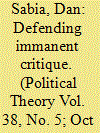

|
|
|
|
|
| Publication |
2010.
|
| Summary/Abstract |
This article develops, illustrates, and defends a conception of immanent critique. Immanent critique is construed as a form of hermeneutical practice and second-order political and normative criticism. The common charge that immanent critique is a form of philosophical conventionalism necessarily committed to value relativism and to the rejection of transcultural and cosmopolitan norms is denied. But immanent critique insists that meaningful and potentially efficacious criticism must be connected to relevant criteria and understandings internal to the culture or social order at which the criticism is directed. The complaint that this demand will likely limit political and moral criticism is also denied, and the ability of immanent critique to develop from convention unconventional thinking is defended and demonstrated.
|
|
|
|
|
|
|
|
|
|
|
|
|
|
|
|
| 2 |
ID:
123071
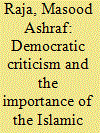

|
|
|
|
|
| Publication |
2013.
|
| Summary/Abstract |
Relying on major debates in reception and reader response theory, this essay attempts to explore the possibilities of reading metropolitan texts about Islam and Islamic culture with an understanding of the Islamic modes of meaning-making and interpretation. Geared toward scholars and students of literature and culture, the essay hopes to foster a more nuanced and complex approach to reading texts that appropriate Islamic raw materials in order to represent a mostly Western poetics and politics.
|
|
|
|
|
|
|
|
|
|
|
|
|
|
|
|
| 3 |
ID:
137391
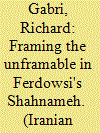

|
|
|
|
|
| Summary/Abstract |
This paper explores the ways in which the Shahnameh thematizes the poet's fraught relationship with language to not only complicate our overall understanding of the epic poem but also our understanding of the language which makes the poem, and the world outside the poem, intelligible. Through a close reading of some of the prologues and epilogues that frame the Shahnameh’s tales, this essay argues that rather than helping us understand how to interpret the epic's morally ambiguous tales, the frames to Ferdowsi's tales, ironically represent a narrator who is in no position to offer us any help. Of course, the poet does give us clues as to why he and consequently we are “helpless” (bichāreh) when it comes to understanding his tales, which, in its own way, can be considered helpful. What seems to hinder understanding at every turn for the poet is, paradoxically, the very language or speech (sakhon/sokhan) that makes understanding possible in the first place.
|
|
|
|
|
|
|
|
|
|
|
|
|
|
|
|
| 4 |
ID:
144363
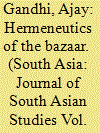

|
|
|
|
|
| Summary/Abstract |
This paper presents an ethnographic study of a redevelopment controversy in Delhi's old city. It considers the perspectives of traders, hawkers, politicians and officials on the proposed revamping of the Meena Bazaar. The paper illustrates how hermeneutic and aesthetic dimensions suffuse public and political life in India. Specifically, sincere intentions, evoked in speech and performance, are seen as a prerequisite of public presentation and as a locus of interpretive scrutiny. In an ambiguous and indeterminate milieu, promises and motives are probingly assessed, often in ironic and dramaturgical form. The paper foregrounds the ‘hermeneutics of the bazaar’, an interpretive sensitivity to intentionality, and ‘structured sincerity’, the efficacy, and reflexive steering, of performed conviction.
|
|
|
|
|
|
|
|
|
|
|
|
|
|
|
|
| 5 |
ID:
154494
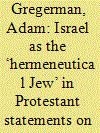

|
|
|
|
|
| Summary/Abstract |
This article studies four major Protestant Christian statements on the State of Israel, from the Presbyterian Church (USA) (1987, 2012) and the Church of Scotland (2003, 2013). While they initially advocate a secular, non-theologized view of Israel, they then paradoxically assess ‒ and often critique ‒ it using Scriptural texts and Christian theological concepts. These assessments are analysed using Jeremy Cohen’s model of the ‘hermeneutical Jew’, which describes a pre-modern Christian construction of the Jew as possessing Scripture but reading it incorrectly (e.g. too literally, particularistically). It is argued that the model applies to these modern Christian statements which view Israel as a hermeneutical Jew. They cast Israel as a corporate religious entity by which the Jewish people might fulfil their religious obligations, but criticize it for failing to properly interpret and apply Scripture in its policies. The article then critiques the appropriateness and accuracy of their viewing Israel as a hermeneutical Jew.
|
|
|
|
|
|
|
|
|
|
|
|
|
|
|
|
| 6 |
ID:
168993
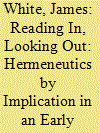

|
|
|
|
|
| Summary/Abstract |
This article investigates aspects of mise-en-page in British Library Add. MS. 27261, an anthology of twenty-three texts on mixed subjects produced for Eskandar Soltān (d. 818/1415), grandson of Timur and self-styled ruler of territories in southern Iran during the early fifteenth century. It examines the juxtaposition of literary and scientific texts together with images in Add. MS. 27261, and explores the correlations that these juxtapositions create. It concludes that the London anthology should be seen as a coherent intellectual enterprise, and as an interpretative project designed to feed Eskandar’s experiments with different forms of knowledge.
|
|
|
|
|
|
|
|
|
|
|
|
|
|
|
|
| 7 |
ID:
133549
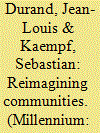

|
|
|
|
|
| Publication |
2014.
|
| Summary/Abstract |
There comes a time when transmitting the history of a national past fails the context of the political present. France and Germany have shared tortuous historical experiences, yet the two are at the forefront of an unprecedented pedagogical development: for the first time ever, two nation-states have created a common history textbook that is used in their senior secondary schools. As such, each country, to borrow Ernst Gellner's formula, has abandoned - qua this textbook - its monopoly of legitimate education. Histoire/Geschichte detaches history from its exclusive national past and introduces the learners to a post-national present. It speaks in a tone that is demanded by a different time and by the new conditions of peoples who are living in a common political space. This article reflects on the meaning and reach of this precedent by first analysing the explicit political and pedagogical explanations inherent to the book. It then identifies and investigates some of the less evident effects of the textbook relating to rethinking war and history, rethinking the monopoly of education, rethinking national identity, and to offering another path to rapprochement.
|
|
|
|
|
|
|
|
|
|
|
|
|
|
|
|
| 8 |
ID:
167965
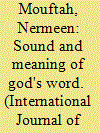

|
|
|
|
|
| Summary/Abstract |
For centuries Muslims have asked whether the Qurʾan should be recited and memorized first and foremost, or whether one must prioritize understanding the meaning of its complex language. What is the best way to encounter God's Word? To explore this question, a women's Qurʾan lesson in a slum of Old Cairo illustrates modern Muslim anxieties over the place of discursive meaning in encounters with the Qurʾan. This article elaborates the concept of affirmation as an analytic to grasp how the women relate to the truth of revelation. Affirmation is a performative and discursive hermeneutic practice that deploys Qurʾanic citation, situates Qurʾanic concepts in daily life, and sutures the efficacy of Qurʾan education with correct language and with right action. Their lessons are indicative of reformist trends in Qurʾan education that open onto questions of meaning and understanding in relation to human interactions with divine speech.
|
|
|
|
|
|
|
|
|
|
|
|
|
|
|
|
| 9 |
ID:
090165
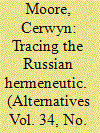

|
|
|
|
|
| Publication |
2009.
|
| Summary/Abstract |
This article makes a contribution to hermeneutic explorations in global politics. Taking as its points of departure the growing body of work on film and the turn to aesthetic and intertextual IR, the article argues that a further conversation with cinema and poetics can be used to develop the interpretive canon in global politics. In particular, the analysis draws upon the idea of cinematic poetics, and more generally the work of Andrei Tarkovsky, who, throughout his films and written work, articulates a particular form of Russian interpretivism. The article explores Tarkovskian cinema and engages in debates about artistic creativity and aesthetics, filmic representations of belonging and spiritualism, all shaped by a Russian hermeneutic tradition. The final sections apply these themes, illustrating how the icon presents a way to read the themes of suffering and salvation, inscribing the formation of identities in global politics.
|
|
|
|
|
|
|
|
|
|
|
|
|
|
|
|
| 10 |
ID:
155167
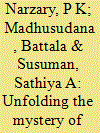

|
|
|
|
|
| Summary/Abstract |
Reliance on traditional methods of birth control causes psychological tension in couples because the fear of unwanted pregnancy bars them from experiencing a healthy sexual life. However, in Assam, half of all contraceptive users depend on traditional methods of birth control. The current study used National Family Health Survey 2005–2006 data. Out of 3840 sample women in the age group 15–49 years, 1286 women are filtered for the present study. Most of the demographic and socioeconomic characteristics of traditional method users fall between those of modern spacing method users and terminal method users. Thus, the burden of unwanted fertility is highest among the traditional method users.
|
|
|
|
|
|
|
|
|
|
|
|
|
|
|
|
|
|
|
|
|